(browse all)
potty training bootcamp
positive discipline academy
tantrums course
courses
membership
resources
about
blog
watch now!
A place where I discuss all things related to toddlers and motherhood!
Subscribe to my Youtube channel
As a clinical psychologist, published author, and mother to two cheeky young children, I get it. I’ve spent YEARS researching and filtering through the noise online, so you don’t have to.
PARENTING TIPS
POTTY TRAINING
ANTIRACISM
PLAY
Blog Topics
SIBLING RIVALRY
SCREEN TIME
TANTRUMS
DISCIPLINE
Hi I'm Dr. Jazmine
How to Best Prepare Your Child for Daycare, Preschool, or Kindergarten
topics:
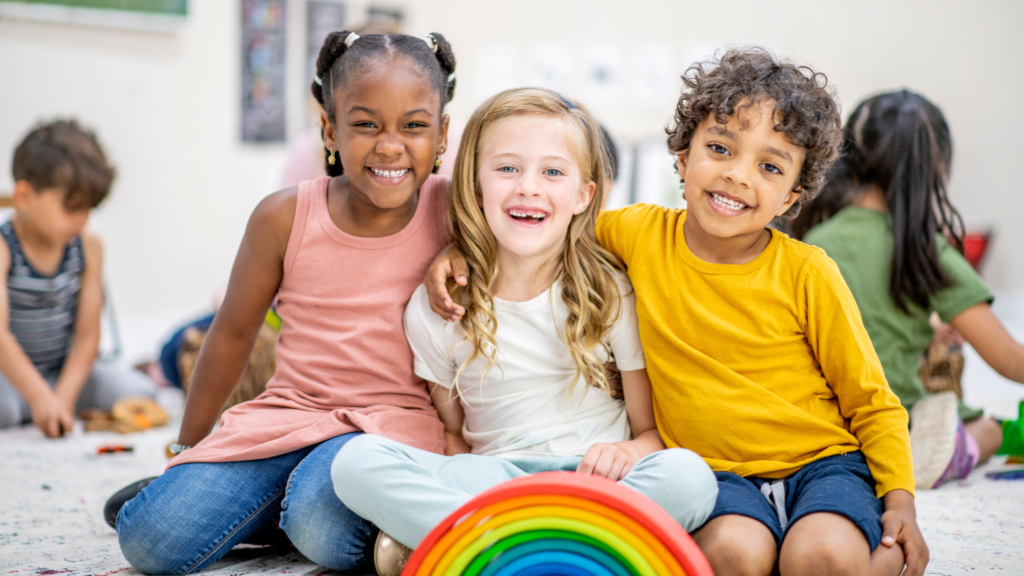
Are you nervous about your child starting school soon? I’m going to share 11 concrete tips on how to emotionally and mentally prepare your child for daycare, preschool, or kindergarten.
#1: Start talking to your child early about starting daycare, preschool, or kindergarten.
You’re going to want to start to plant seeds early on – even if you don’t have all the details for the new daycare or school. And what that means is in everyday conversations mention they’re going to be starting a new school or daycare where they’ll have a new teacher. They’re going to be around new friends. They’re going to be in this new environment.
It’s easy to think, “Well, we don’t have everything figured out yet. We don’t know what school, we don’t know this. We don’t know that.” And that’s okay. You don’t need to have all of it figured out to plant seeds. Basically what you’re doing is you’re starting the early process of mentally preparing your child that a change is going to come.
And you can be honest with your child that you don’t have all the details yet, but you’ll have them involved in as much of the process as possible. Let your child know you’ll keep them updated every step of the way and even bring them along to see the school or meet the teachers if possible.
The seed you’re planting is that school is this fun place where they’re going to play with new toys, play with new friends, and they’re going to have a teacher that’s going to teach them all these amazing things. And it’s going to be a very fun place.
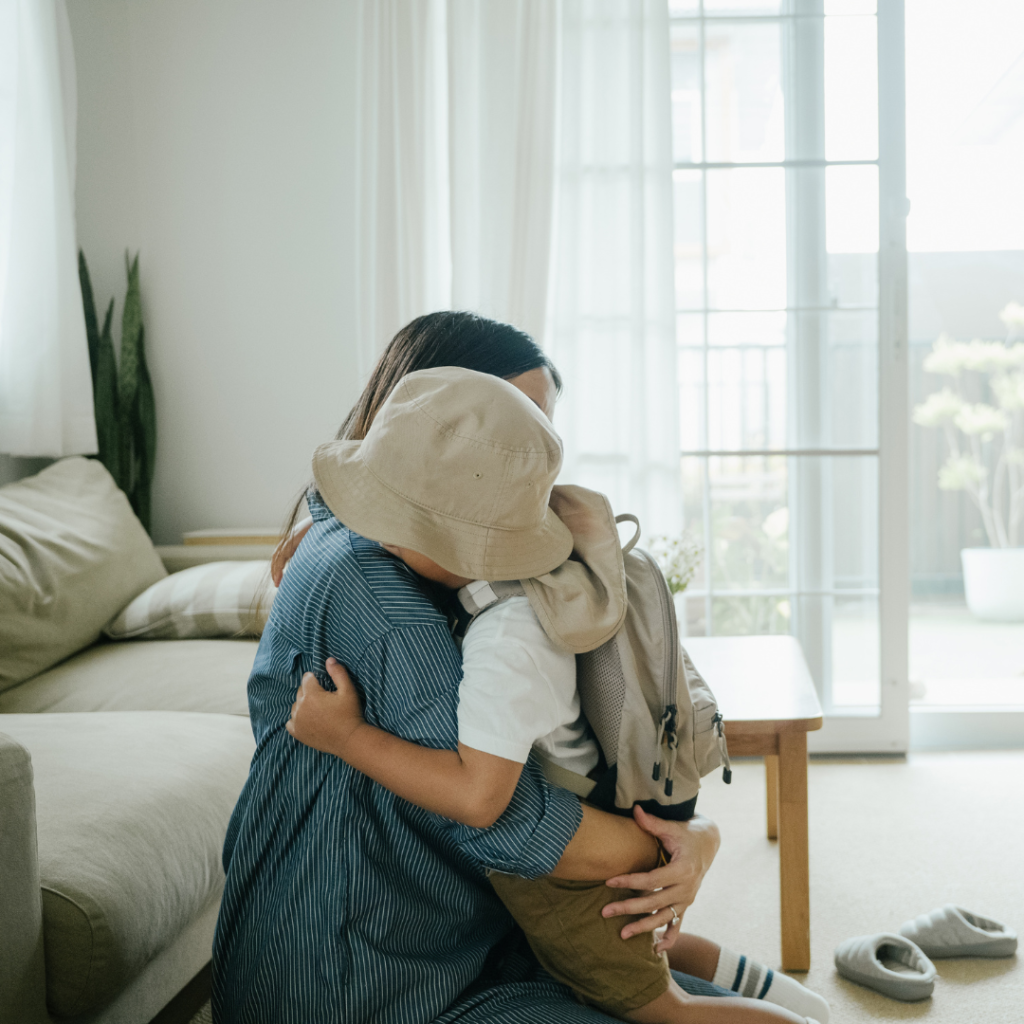
Invite them to ask questions that they might have. You might not know all the answers, but it’s still important to get that conversation started.
#2: Teach your child how to get their needs met.
They’re going to need to know how to communicate what they need when they’re at school. As soon as your child can talk, you want to teach them very easy terms like:
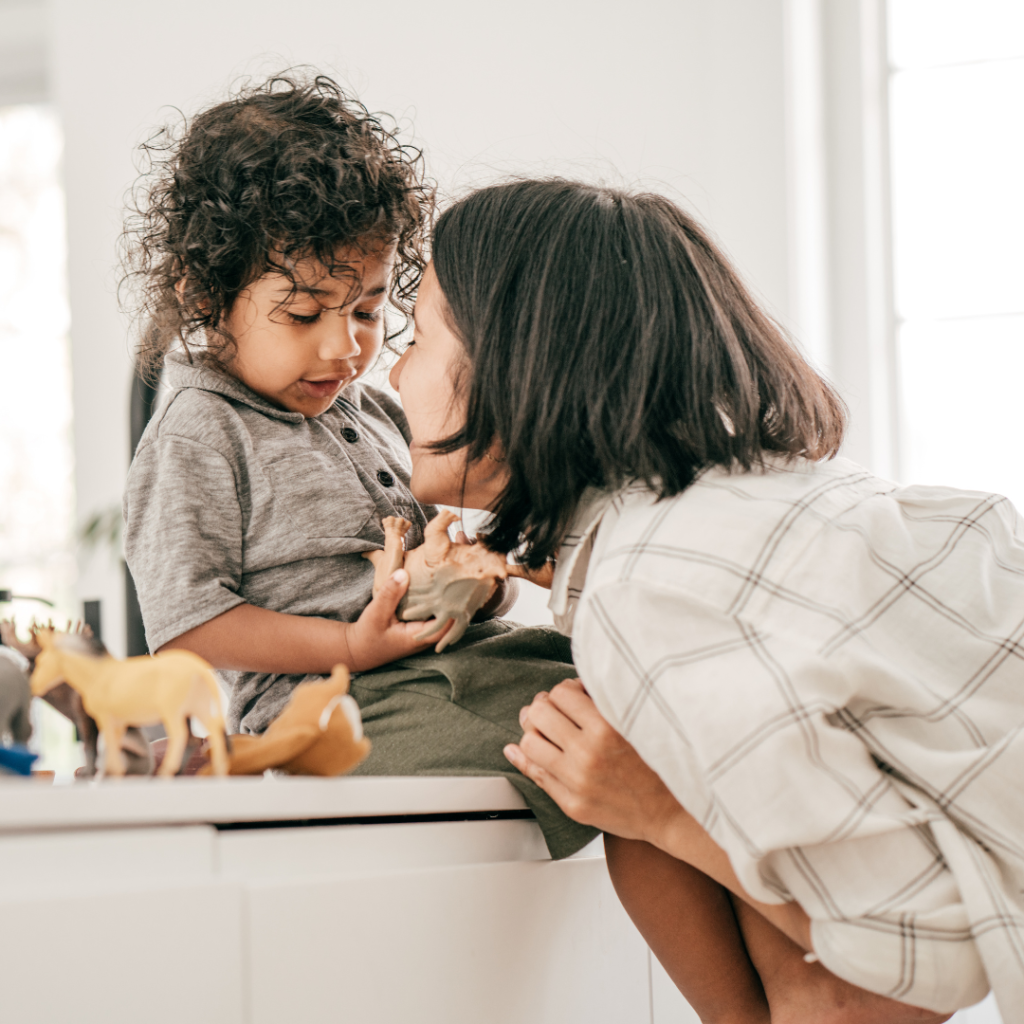
- “Space, please.”
- “No, thank you.”
- “I don’t like that.”
- “I’m going to go get help.”
- “I’m not done playing with this. I’ll let you know when I’m done.”
- “May I have a turn, please?”
You’re teaching them concrete things they can say when they need certain needs met in the new school or daycare. If you have an early talker, you want to get them familiar with things they can say so they’re not lashing out with their words or using their body to communicate what they need.
If you have a preverbal child, you can teach them a bit of sign language and share what they know with their teacher.

#3: Allow your child to tour their daycare, preschool, or kindergarten and meet their teacher.
As soon as possible, have them meet their teacher and see their new school, classroom, or daycare.
If it’s not possible, then go on the school’s website and show them the pictures of the school and staff. You can also drive to the school so they get familiar with the route you’ll take and what the school looks like.
Whatever you can do to familiarize your child with their new school routine, the better.
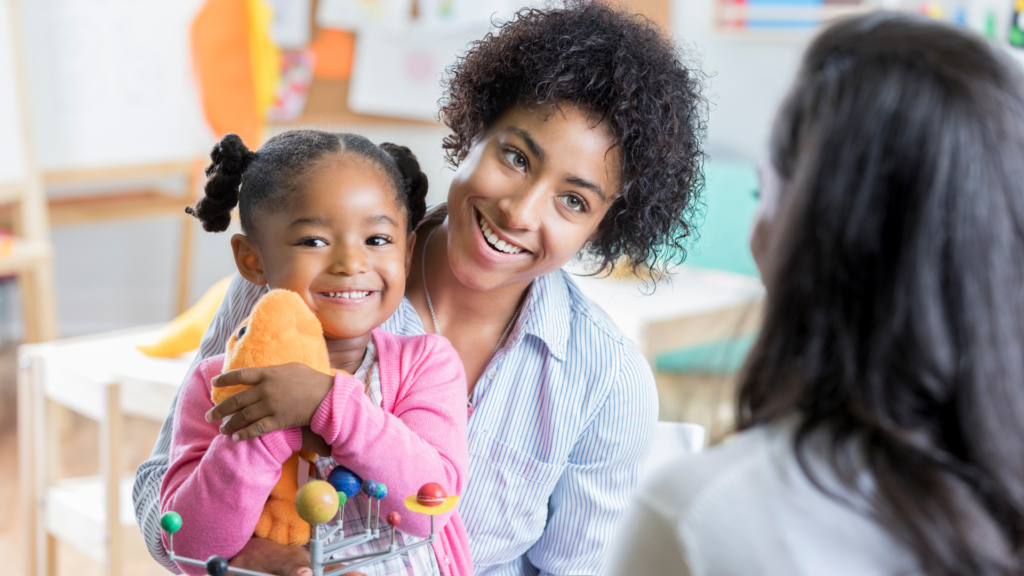
#4: Teach your child how to raise their hand.
Raising their hand is going to be a very important skill that they’re going to need to know how to do in a classroom or a group setting (especially if you have a preschooler) – so start practicing.
Let your child know their teacher is going to expect them to raise their hand whenever they have something that they want to say or a question they want to ask. And they’re going to have to wait until their teacher calls on them before they can say whatever they need to say.
Introduce your child to this concept and start role-playing and practicing to better prepare them for preschool or kindergarten. Teach it in a fun way. Make it a game, make it fun, make it silly. You could even model what it looks like raising your hand when you have something exciting to say or a question you want to ask, but this will be a very good skill that will come in handy when they’re at school.
#5: Work on promoting independent play at home.
Encouraging independent play is going to be an important skill for your child to know in the school setting. They’re not always going to have that one-on-one contact with a teacher or another adult. So fostering that skill at home and starting that process if you haven’t already will help prepare them for having to play on their own at daycare, preschool, or kindergarten.
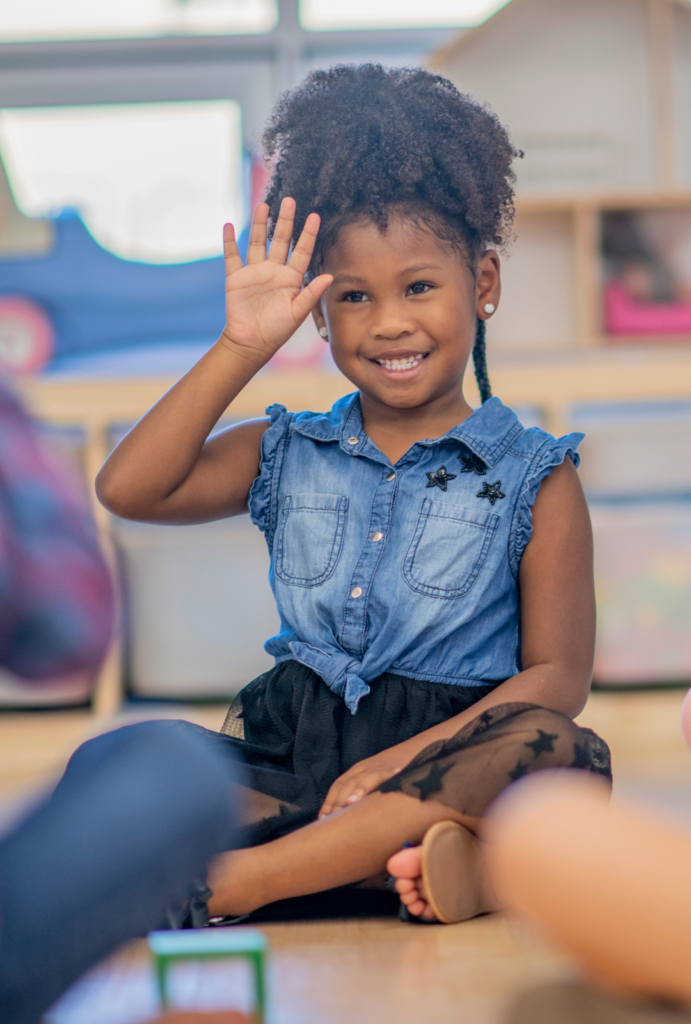
#6: Read children’s books about going to daycare, preschool, or kindergarten.
I’m a huge fan of children’s books in starting and keeping conversations going and helping to normalize difficult changes and topics that children go through to help teach them new skills.
I have several recommendations for you to check out.
The Kissing Hand by Audrey Penn
It goes through the story of a raccoon who is scared to start school. His mom teaches him a technique he can do at school called the kissing hand. It reminds him that his mom loves him and she is always there to send her love – even if he can’t see her, she’s there.
I love the basic idea of this book because it’s teaching your child a coping skill that they have the power at school to help themselves feel better. This could be a wonderful skill you teach your child in the days and weeks leading up to school.

The Invisible String by Patrice Karst
This is another great book I like in terms of emotionally preparing your child for a new school or separation from you. It has a similar idea as The Kissing Hand, but the basic idea is we’re all connected through this invisible string of love and know deep in our heart we’re always connected to the ones we love.
Llama Llama Misses Mama by Anna Dewdney
It’s Llama Llama’s first day of preschool, and Mama has made sure he’s ready by showing him the classroom, meeting the teacher, and seeing all the fun games he can play. But when it’s time for her to leave, he’s not sure he’s ready. He soon learns from the other kids how fun and exciting preschool can be.

Preschool, Here I Come! by D.J. Steinberg
The book is a collection of funny, happy poems that celebrate all the big moments of preschool – from saying goodbye to parents on the first day to watching butterflies hatch in spring.
The Berenstain Bears Go to School by Stan and Jan Berenstain
Sister Bear is worried about starting kindergarten. Will her teacher be nice? Will she make friends? What will she do in class all day? The story helps kids process through the first-day nerves and includes 50 stickers for your child to play with.
The Pigeon HAS to Go to School! by Mo Willems
Pigeon questions why he has to go to school, worries what if his teacher doesn’t like him, and wonders if he’ll learn too much. Pigeon asks many of the questions your child may be wondering and helps start the conversation about these concerns.
Our Class is a Family by Shannon Olsen
This is a book that will help build and strengthen the class community. Kids learn their classroom is a place where it’s safe to be themselves, it’s okay to make mistakes, and it’s important to be a friend to others.

Kindergarten, Here I Come! by D.J. Steinberg
This is another book full of fun poems about starting kindergarten and includes a sheet of stickers. The book celebrates all the big milestones and moments every kindergartener experiences from first-day nerves to the hundredth-day party.
The Night Before Kindergarten by Natasha Wing
The story takes you along with kids as they prepare for kindergarten by packing school supplies, posing for pictures, and saying goodbye to Mom and Dad. It’s written to mimic the classic Christmas poem The Night Before Christmas.

On the First Day of Kindergarten by Tish Rabe
This book parallels the 12 days of Christmas and turns it into the 12 days of kindergarten. It takes the reader through all the different “cool” things your child will do in kindergarten, from jumping rope to learning shapes and eating lunch with friends.
The King of Kindergarten by Derrick Barnes
The hero of the story can’t wait to start kindergarten and be part of a whole new kingdom of kids. He’s ready for the new experiences and challenges of kindergarten and can’t wait to tell his mom and dad all about it.
The Day You Begin by Jacqueline Woodson
Written by a National Book Award Winner, this book tells the story of finding the courage to connect when you feel scared and alone. It explores the idea of feeling different from the way you look or talk or because of where you’re from or what you eat. Kids are encouraged to be brave and take the steps to connect with others.
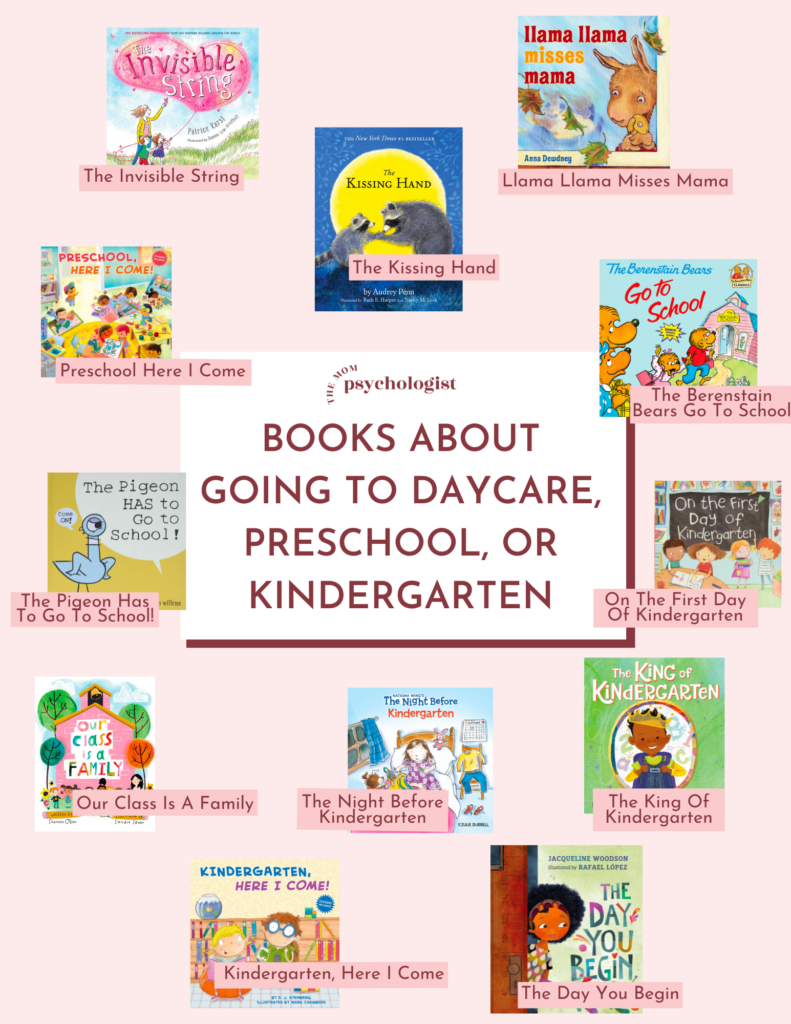
#7: Start practicing their morning routine to get ready for daycare or school.
I recommend you practice several days – if not weeks – leading up to starting daycare or school. Go through the sequence of tasks they have to complete to get ready for school or for daycare to help them learn what they’ll need to do.
Along with that same idea of routines, you want to also verbally process with them what their new routine is going to look like.
- “So we’re going to wake up in the morning, we’re going to do X, Y, and Z.”
- “Then we’re going to go to school and then Mommy and Daddy are going to go to work.”
- “Then we’re going to pick you up after school ends/after storytime/after lunch.”
Give your child a concrete marker of when to expect you to pick them up. If every day might be a little different, then you don’t need to do this.
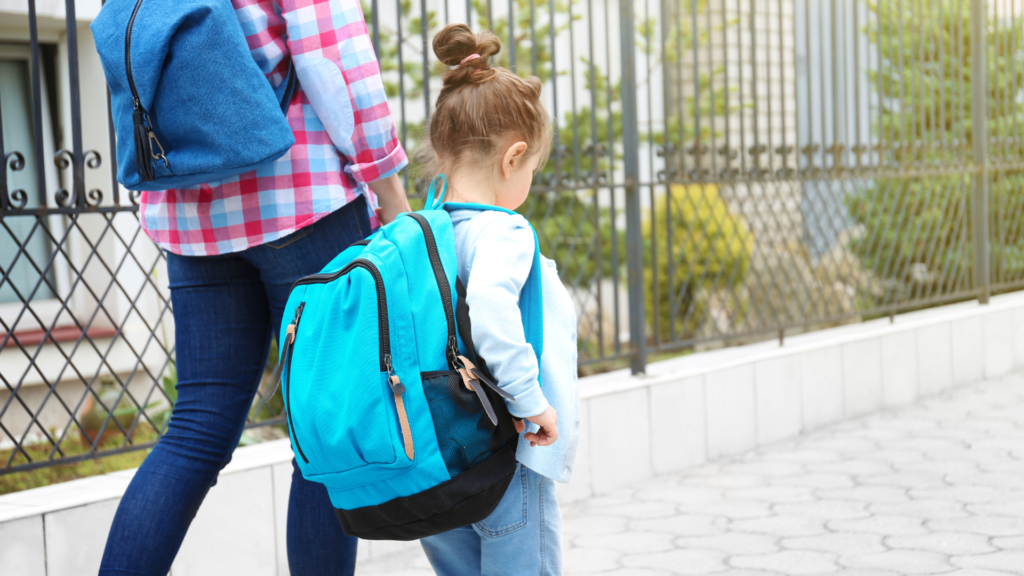
#8: Create a connection routine for when your child gets home from school.
When your child gets home from school, they’re going to be tired. They’re going to have a lot of tantrums. They’re going to be exhausted and overstimulated. They’re probably going to be hungry.
So don’t over plan anything since you want to get your child’s needs met by working in some snacks, some cuddle time, and a bit of playtime to reconnect after that large separation.
Especially in the early days and early weeks of this big change where your child is trying to get used to everything that has changed in their life and routine, you want to build in some reconnection after the separation.
#9: Start teaching your child life skills they’ll need at daycare, preschool, or kindergarten.
These skills could be:
- How to push down and pull up their pants
- How to wipe their bottoms
- How to get their shoes on or tie their shoes
Teach them the skills they’ll need that are age appropriate depending on the environment they’re going to (daycare vs. preschool vs. kindergarten). This will help prepare your child for the transition.
#10: Have your child create artwork about daycare or school.
To help emotionally prepare your child for school or daycare, have them make some artwork that shows how they think school will be or what they’re looking forward to doing at school.
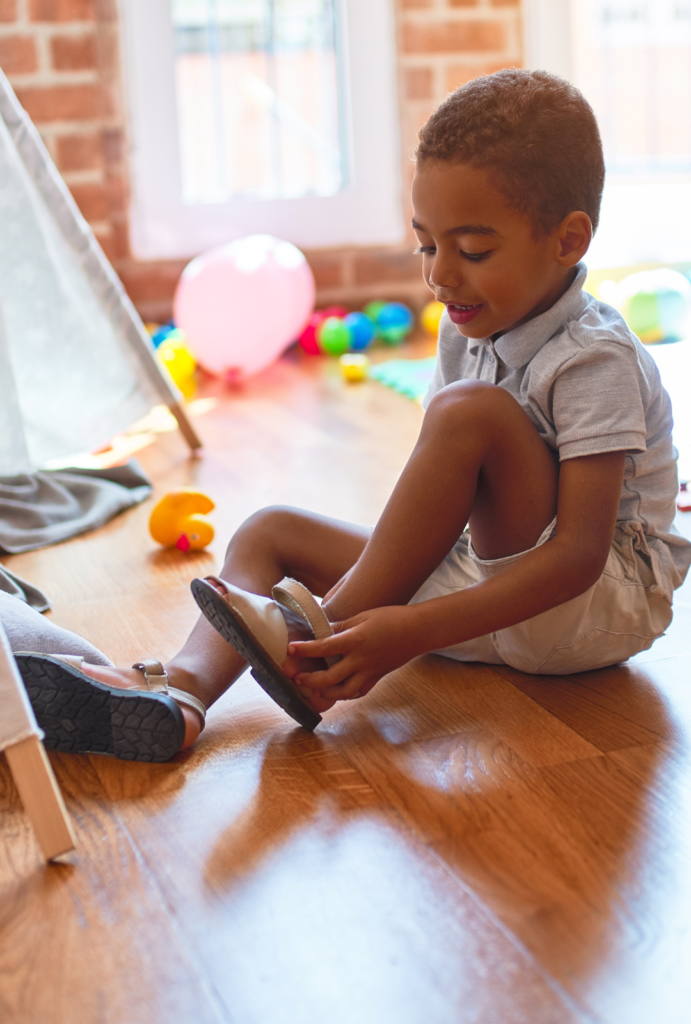
They could draw a picture for their new teacher. If you know the name, tell them that or share a picture if you have access to one.
This will be another conversation starter and another way to gently prepare your child and get them looking forward to starting daycare, preschool, or kindergarten.
#11: Get your child involved in the process of preparing to start preschool or kindergarten.
So whether that’s going out and buying a new lunch box or going to buy new school outfits, get your child involved so they have some control over the change. If you still want some control over what they choose, narrow it down and have them pick between two things that you’re okay with.
This will help them feel more in control, feel more involved, and emotionally prepare for what’s coming and also look forward to it. “I get my new backpack with my new school supplies, my new outfits, that’s really exciting!” I remember as a kid being so excited about those things.
This can be a great way to get them looking forward to and preparing for their daycare, preschool, or kindergarten.
You’ve got this,
Dr. Jazmine

P.S. Ever wonder what type of parent you are? Like do you tend to be more permissive, authoritarian, or do you strike a balance between love & limits (authoritative)?
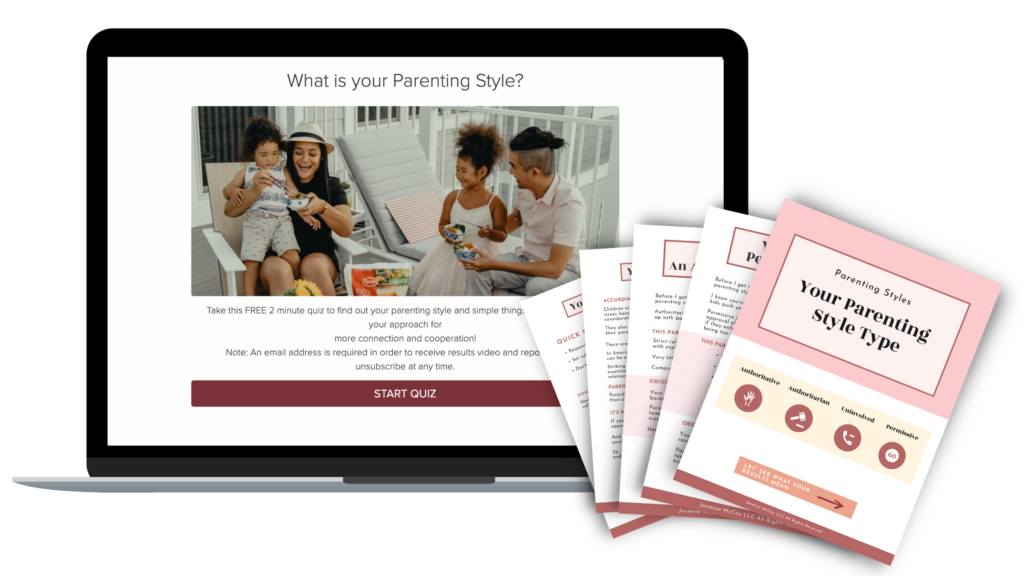
Take my Parenting Style Quiz and find out! All you need is 2 minutes and an email address.
Once you complete the quiz, I’ll send you a personalized report and video with your results. You’ll receive several resources that will help you grow to create more cooperation and connection.
Love this? Don’t lose it! Click below and save it to your Pinterest!
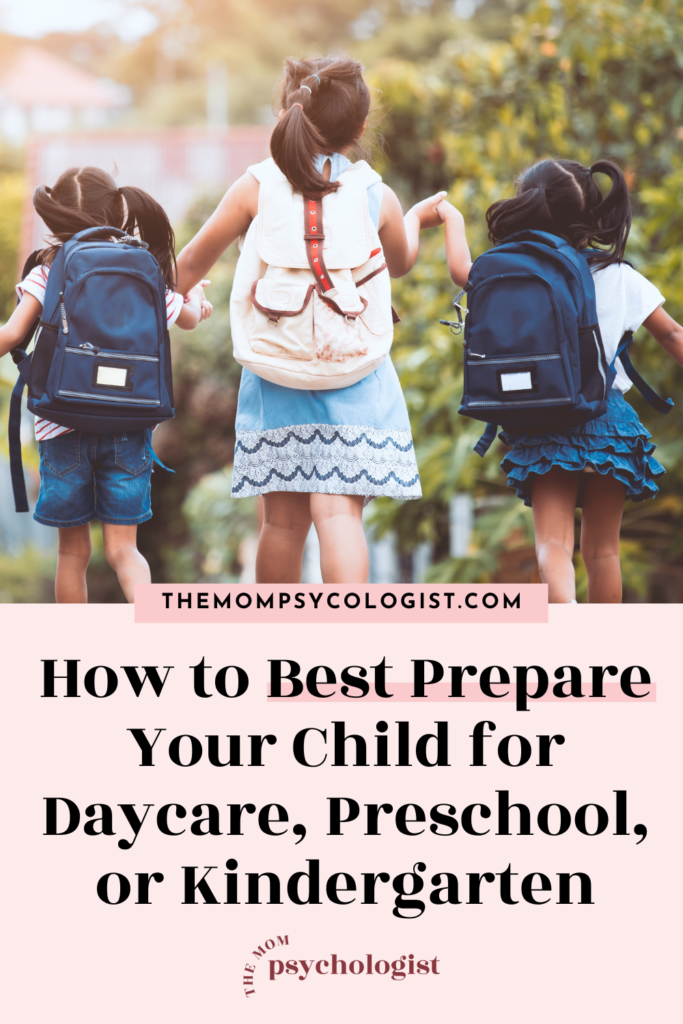
Leave a Reply Cancel reply
Copyright The Mom Psychologist 2024
join the mailing list
explore
resources
information
About
Blog
YouTube
Podcast
Membership
Privacy Policy
Terms of Use
Contact







